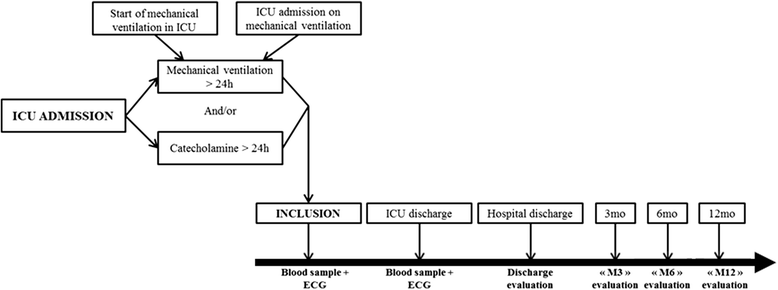Post-ICU discharge and outcome: rationale and methods of the The French and euRopean Outcome reGistry in Intensive Care Units (FROG-ICU) observational study
- PMID: 26459405
- PMCID: PMC4603975
- DOI: 10.1186/s12871-015-0129-2
Post-ICU discharge and outcome: rationale and methods of the The French and euRopean Outcome reGistry in Intensive Care Units (FROG-ICU) observational study
Abstract
Background: Previous studies have demonstrated that ICU (intensive care unit) survivors have decreased long-term survival rates compared to the general population. However, knowledge about how to identify ICU survivors with higher risk of death and the adjustable factors associated with mortality is still lacking.
Methods and design: The FROG-ICU (the French and European Outcome Registry in Intensive Care Units) study is a prospective, observational, multicenter cohort study where ICU survivors are followed up to one year after ICU discharge. Beside one year survival, the study is designed to assess incidence and identifying risk factors for mortality over the year following discharge from the ICU. All consecutive patients admitted in ICU to the 28 participating centers during the study period will be included. Every subject will undergo an evaluation at admission, throughout the ICU stay and at ICU discharge. The global, especially cardiovascular, assessment of each subject will be performed through a complete clinical exam, instrumental tests (electrocardiogram, echocardiogram) and biological parameters. Blood and urine samples will be collected at admission and at discharge with the primary goal to assess effectiveness of routine and novel cardiovascular, inflammatory and renal biomarkers, with potential interest in risk stratification for patients who survive an ICU stay. The follow up will include a careful tracking of patients through telephone calls and questionnaires at 3, 6 and 12 months after ICU discharge. FROG-ICU aims to identify the clinical and biological phenotype of patients with different levels of probability of death in the year after ICU discharge.
Discussion: FROG-ICU has been designed to better understand long term outcome after ICU discharge as well as risk factors for all-cause and cardiovascular morbidity and associated mortality. It is a large prospective multicenter cohort with a biological (on plasma and urine) collection and one-year follow-up of ICU patients. FROG ICU will allow performing a risk stratification of ICU survivors as to recognize the subset of patients who may benefit from an early intervention to allow decreased cardiovascular morbidity and related mortality.
Trial registration: ClinicalTrials.gov NCT01367093 .
Similar articles
-
Exercise rehabilitation following intensive care unit discharge for recovery from critical illness.Cochrane Database Syst Rev. 2015 Jun 22;2015(6):CD008632. doi: 10.1002/14651858.CD008632.pub2. Cochrane Database Syst Rev. 2015. PMID: 26098746 Free PMC article.
-
Automated monitoring compared to standard care for the early detection of sepsis in critically ill patients.Cochrane Database Syst Rev. 2018 Jun 25;6(6):CD012404. doi: 10.1002/14651858.CD012404.pub2. Cochrane Database Syst Rev. 2018. PMID: 29938790 Free PMC article.
-
[Volume and health outcomes: evidence from systematic reviews and from evaluation of Italian hospital data].Epidemiol Prev. 2013 Mar-Jun;37(2-3 Suppl 2):1-100. Epidemiol Prev. 2013. PMID: 23851286 Italian.
-
The Black Book of Psychotropic Dosing and Monitoring.Psychopharmacol Bull. 2024 Jul 8;54(3):8-59. Psychopharmacol Bull. 2024. PMID: 38993656 Free PMC article. Review.
-
Early intervention (mobilization or active exercise) for critically ill adults in the intensive care unit.Cochrane Database Syst Rev. 2018 Mar 27;3(3):CD010754. doi: 10.1002/14651858.CD010754.pub2. Cochrane Database Syst Rev. 2018. PMID: 29582429 Free PMC article.
Cited by
-
Identifying clinical subtypes in sepsis-survivors with different one-year outcomes: a secondary latent class analysis of the FROG-ICU cohort.Crit Care. 2022 Apr 21;26(1):114. doi: 10.1186/s13054-022-03972-8. Crit Care. 2022. PMID: 35449071 Free PMC article.
-
Gender and survival of critically ill patients: results from the FROG-ICU study.Ann Intensive Care. 2019 Mar 29;9(1):43. doi: 10.1186/s13613-019-0514-y. Ann Intensive Care. 2019. PMID: 30927096 Free PMC article.
-
Plasma and Urinary Biomarkers Improve Prediction of Mortality through 1 Year in Intensive Care Patients: An Analysis from FROG-ICU.J Clin Med. 2023 May 6;12(9):3311. doi: 10.3390/jcm12093311. J Clin Med. 2023. PMID: 37176751 Free PMC article.
-
Elevated plasma Galectin-3 is associated with major adverse kidney events and death after ICU admission.Crit Care. 2022 Jan 6;26(1):13. doi: 10.1186/s13054-021-03878-x. Crit Care. 2022. PMID: 34991653 Free PMC article.
-
Clinical phenotypes of cardiogenic shock survivors: insights into late host responses and long-term outcomes.ESC Heart Fail. 2024 Apr;11(2):1242-1248. doi: 10.1002/ehf2.14596. Epub 2023 Dec 4. ESC Heart Fail. 2024. PMID: 38050658 Free PMC article.
References
-
- Turnbull AD, Carlon G, Baron R, Sichel W, Young C, Howland W. The inverse relationship between cost and survival in the critically ill cancer patient. Crit Care Med. 1979;7(1):20–3. - PubMed
-
- Spagnolo SV, Hershberg PI, Zimmerman HJ. Medical intensive care unit. Mortality rate experience in large teaching hospital. N Y State J Med. 1973;73(6):754–7. - PubMed
-
- Dowdy DW, Eid MP, Sedrakyan A, Mendez-Tellez PA, Pronovost PJ, Herridge MS, et al. Quality of life in adult survivors of critical illness: a systematic review of the literature. Intensive Care Med. 2005;31(5):611–20. - PubMed
Publication types
MeSH terms
Associated data
LinkOut - more resources
Full Text Sources
Other Literature Sources
Medical


